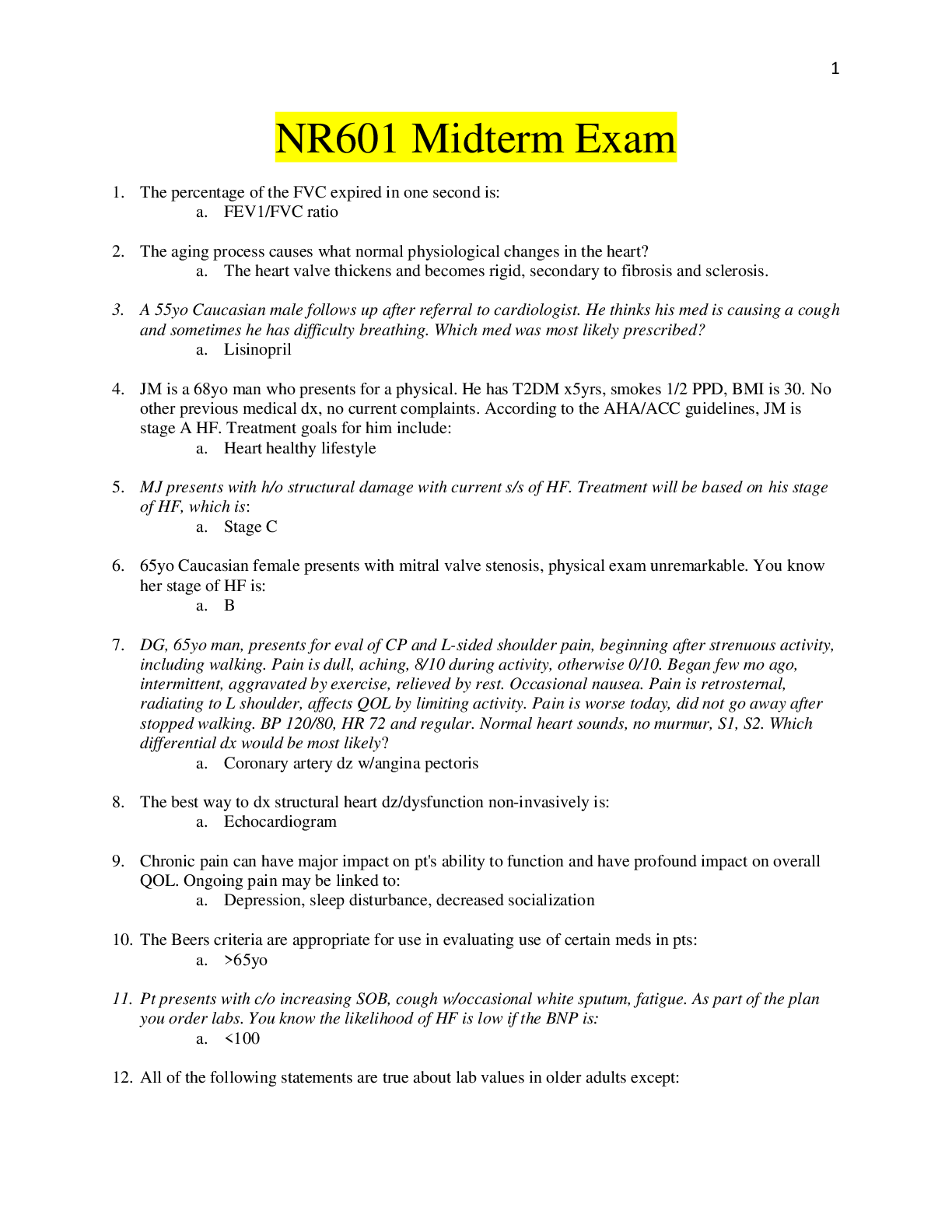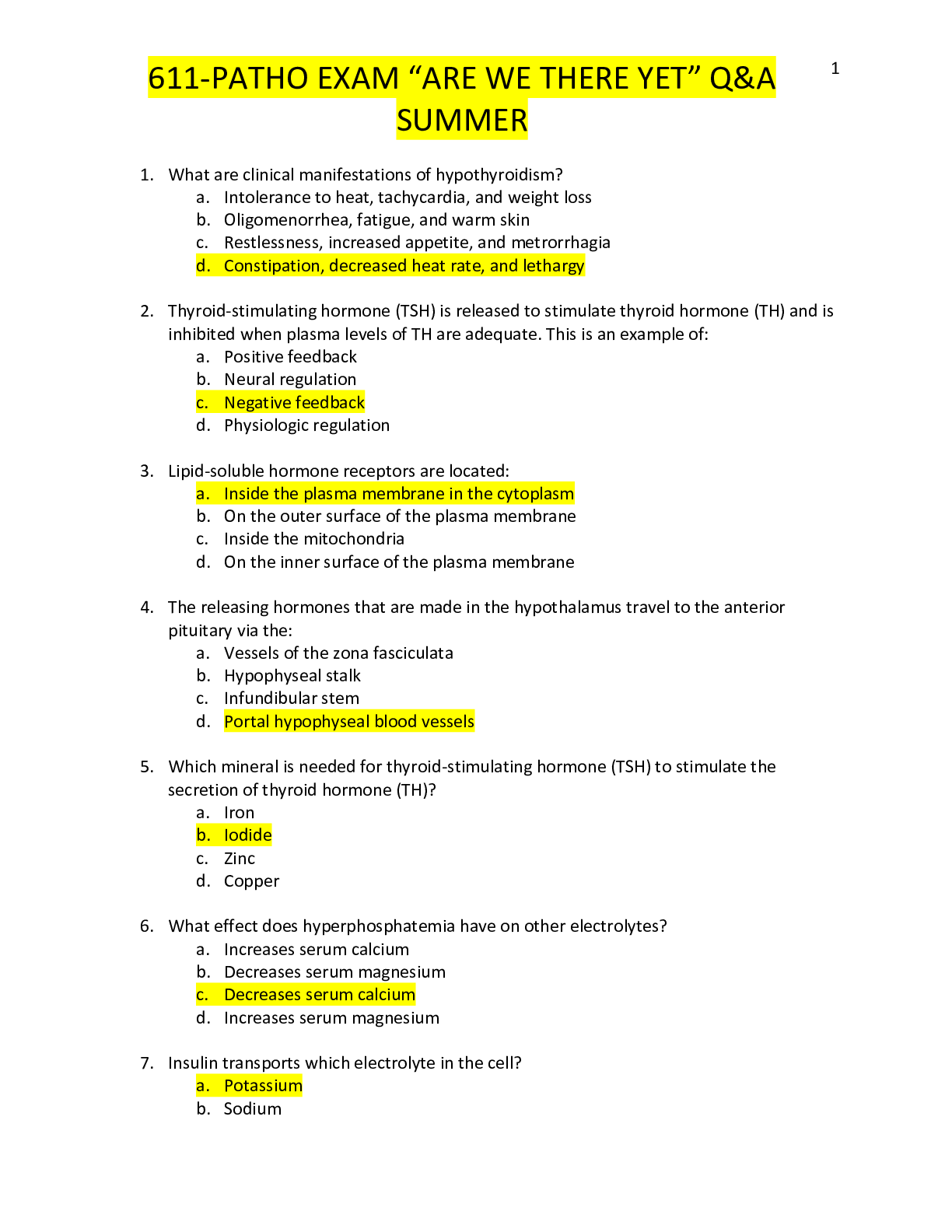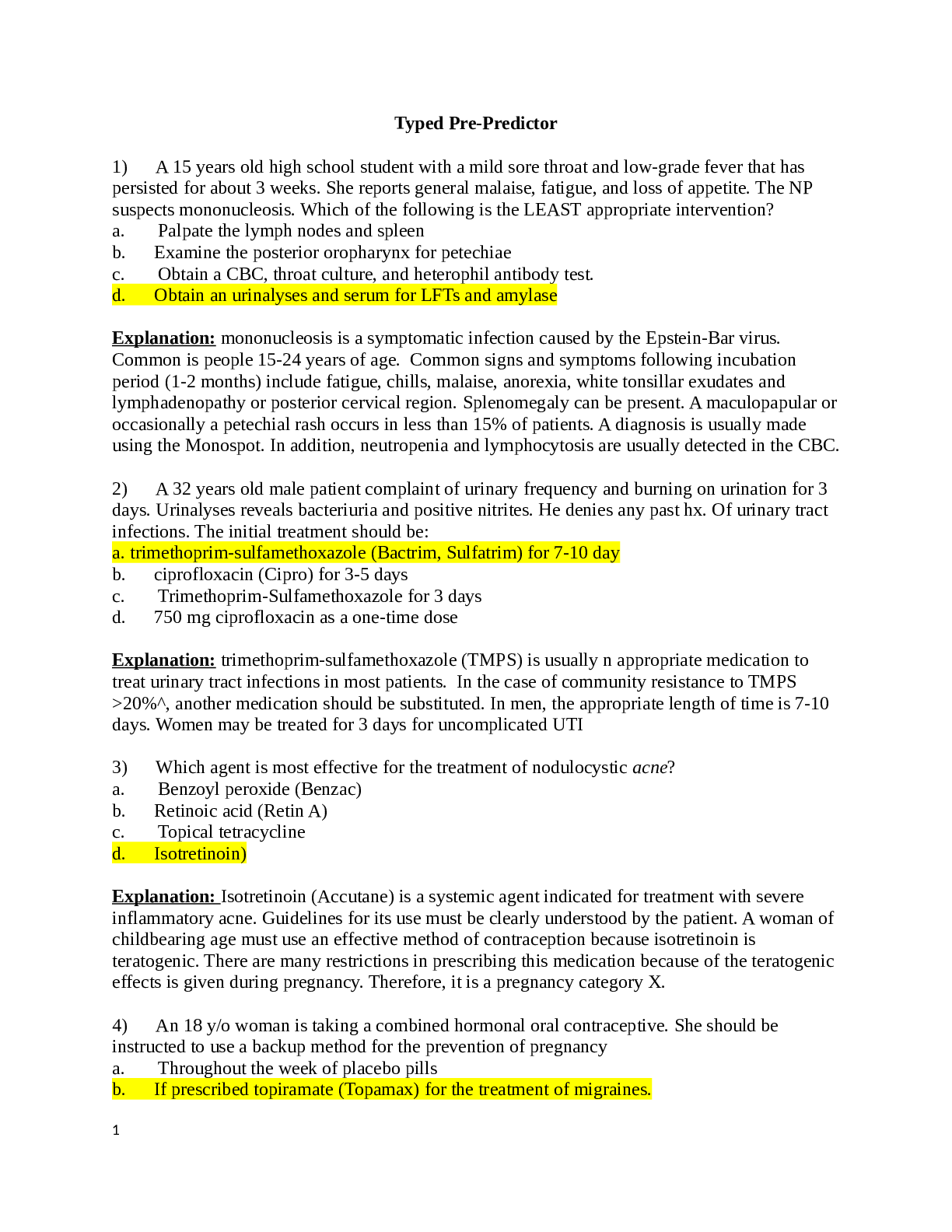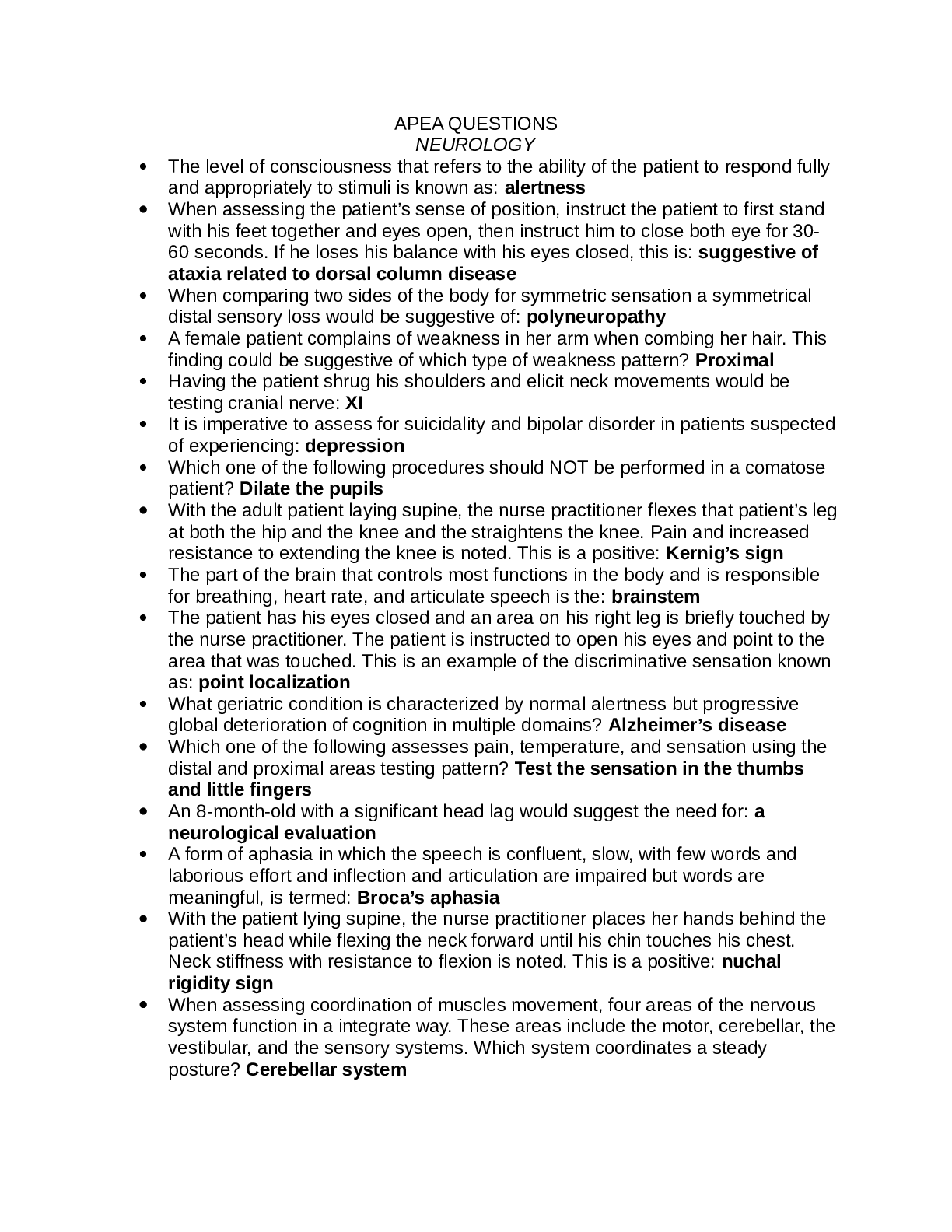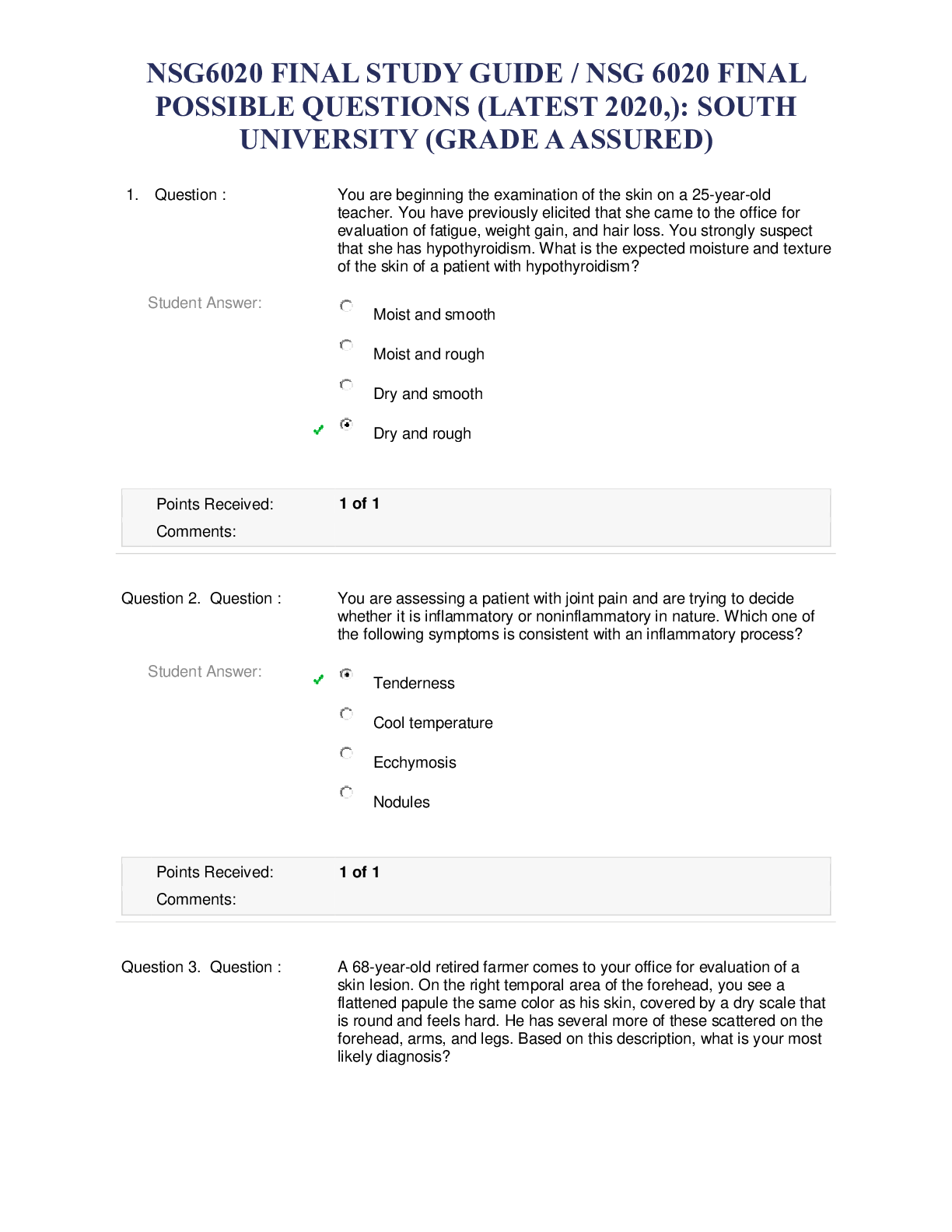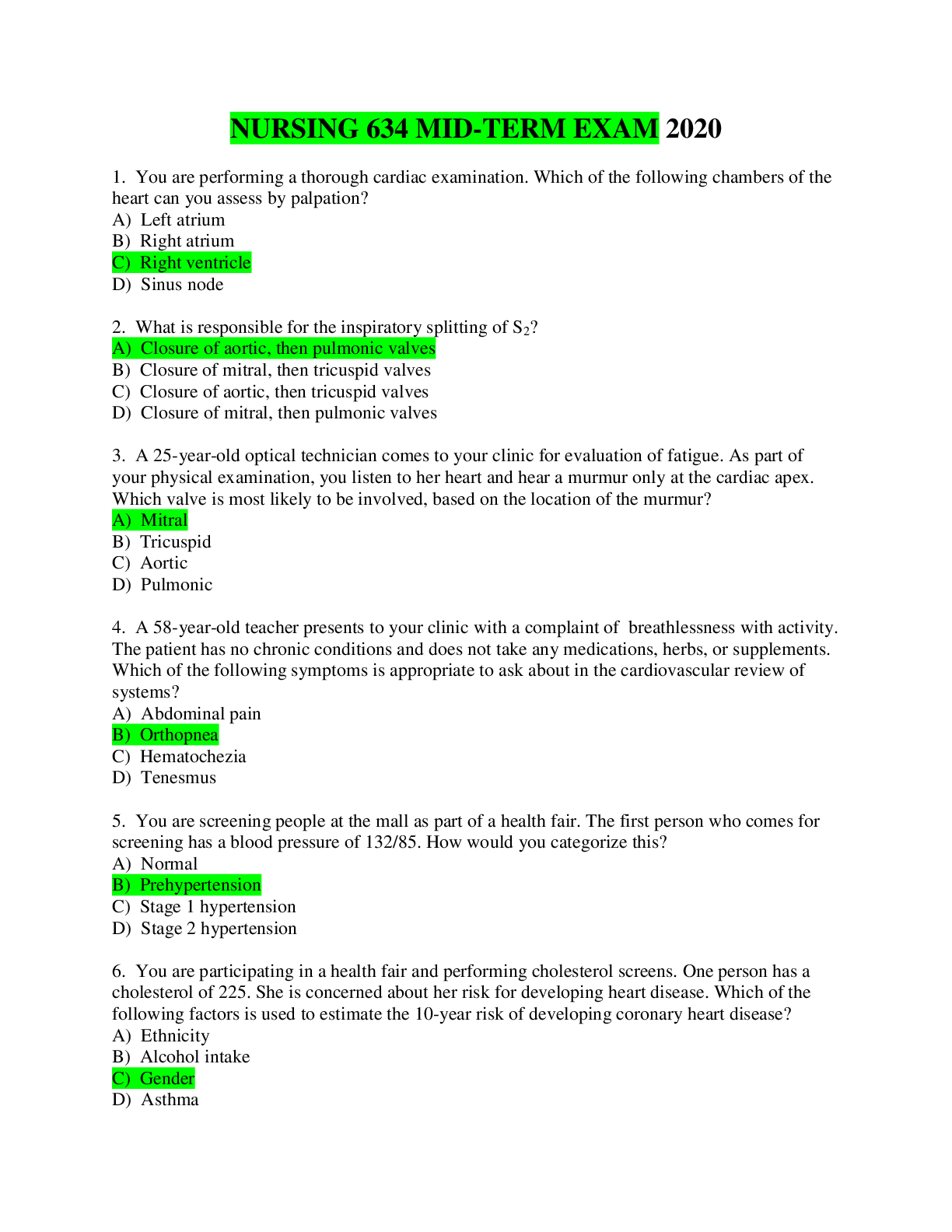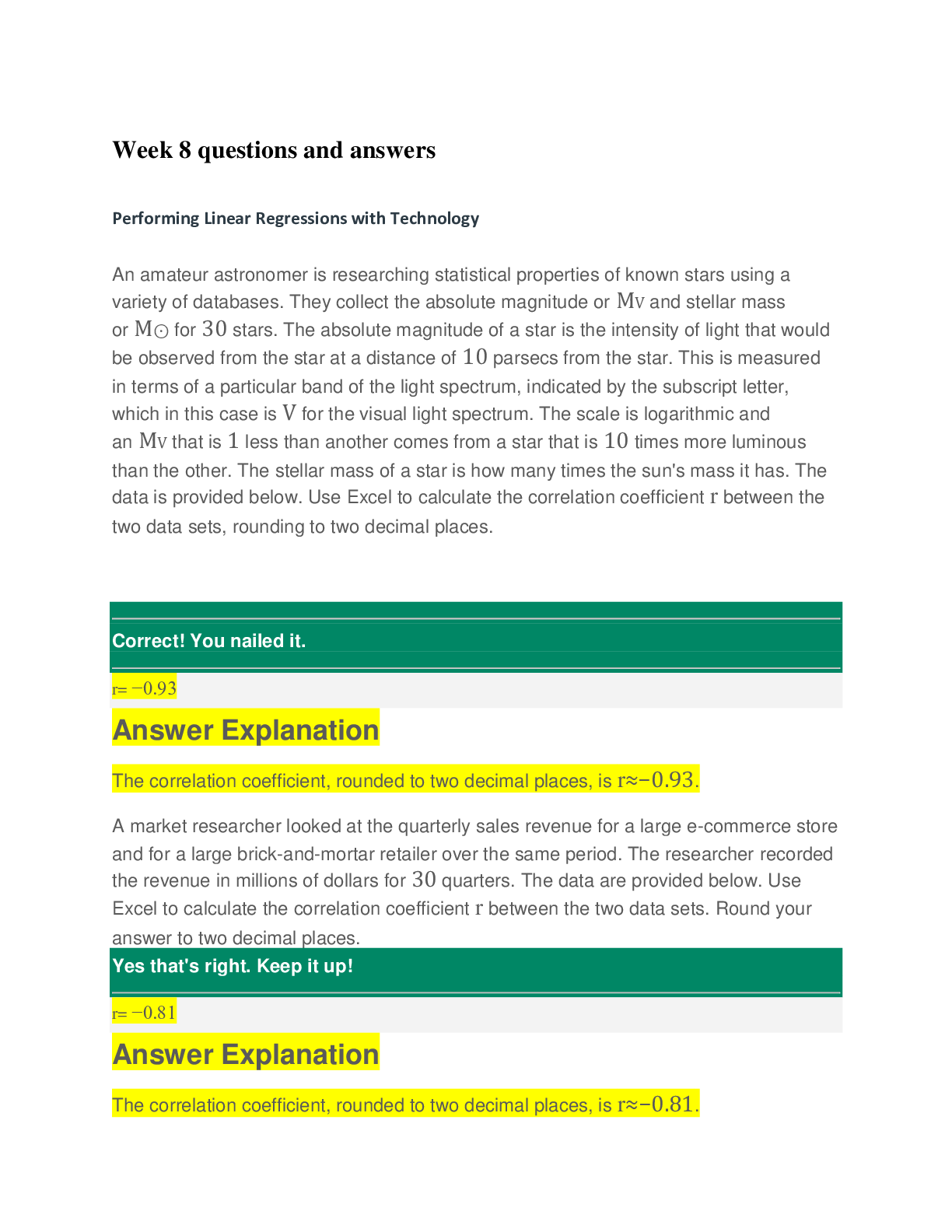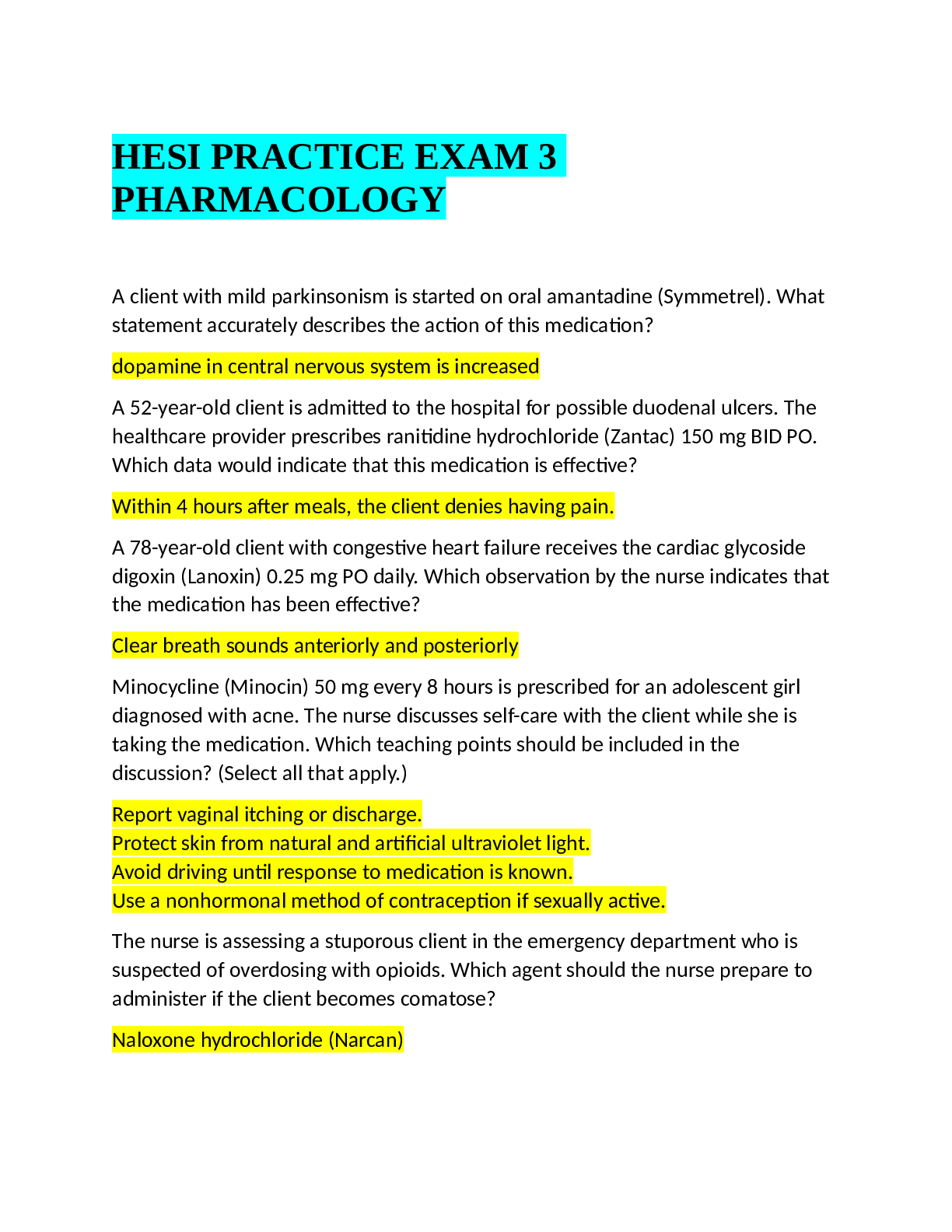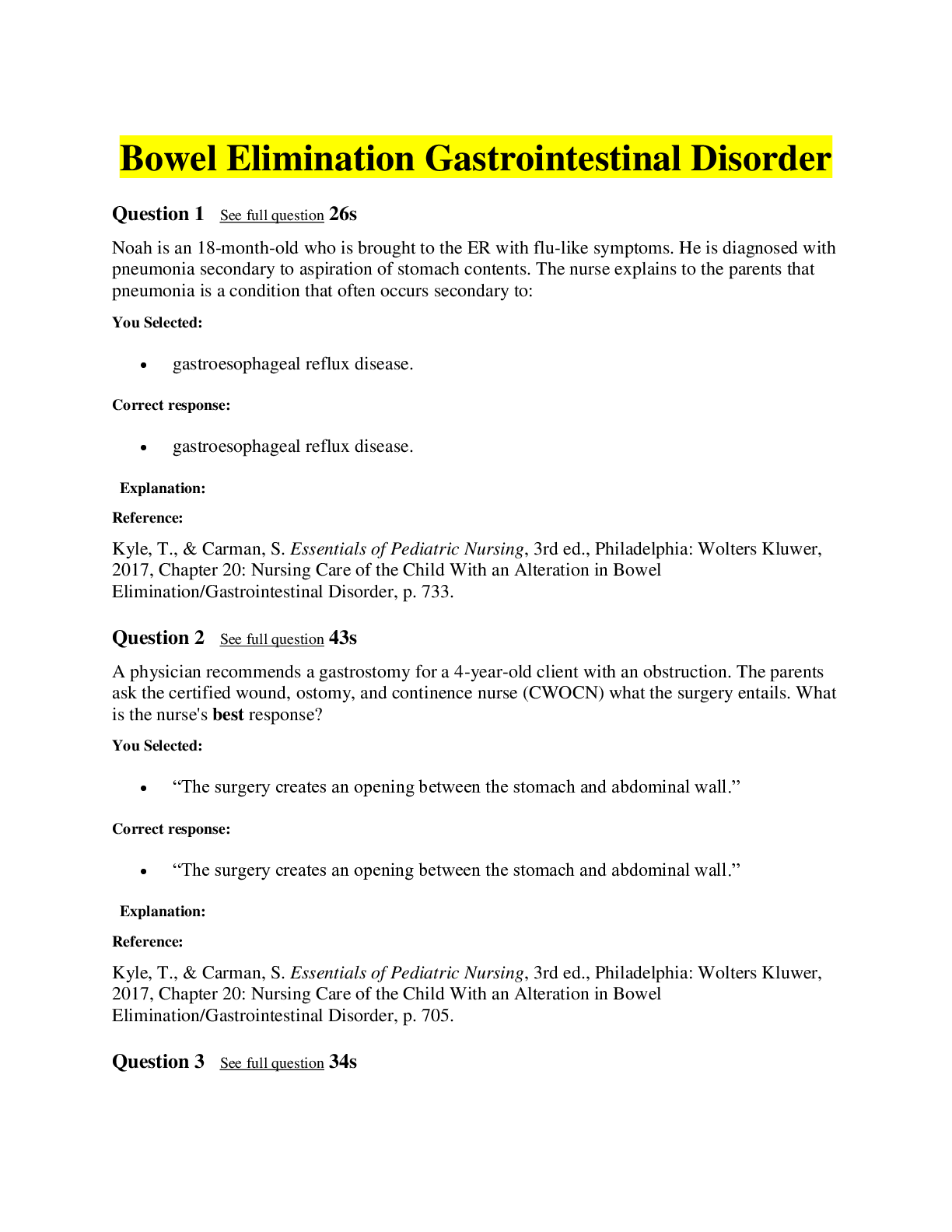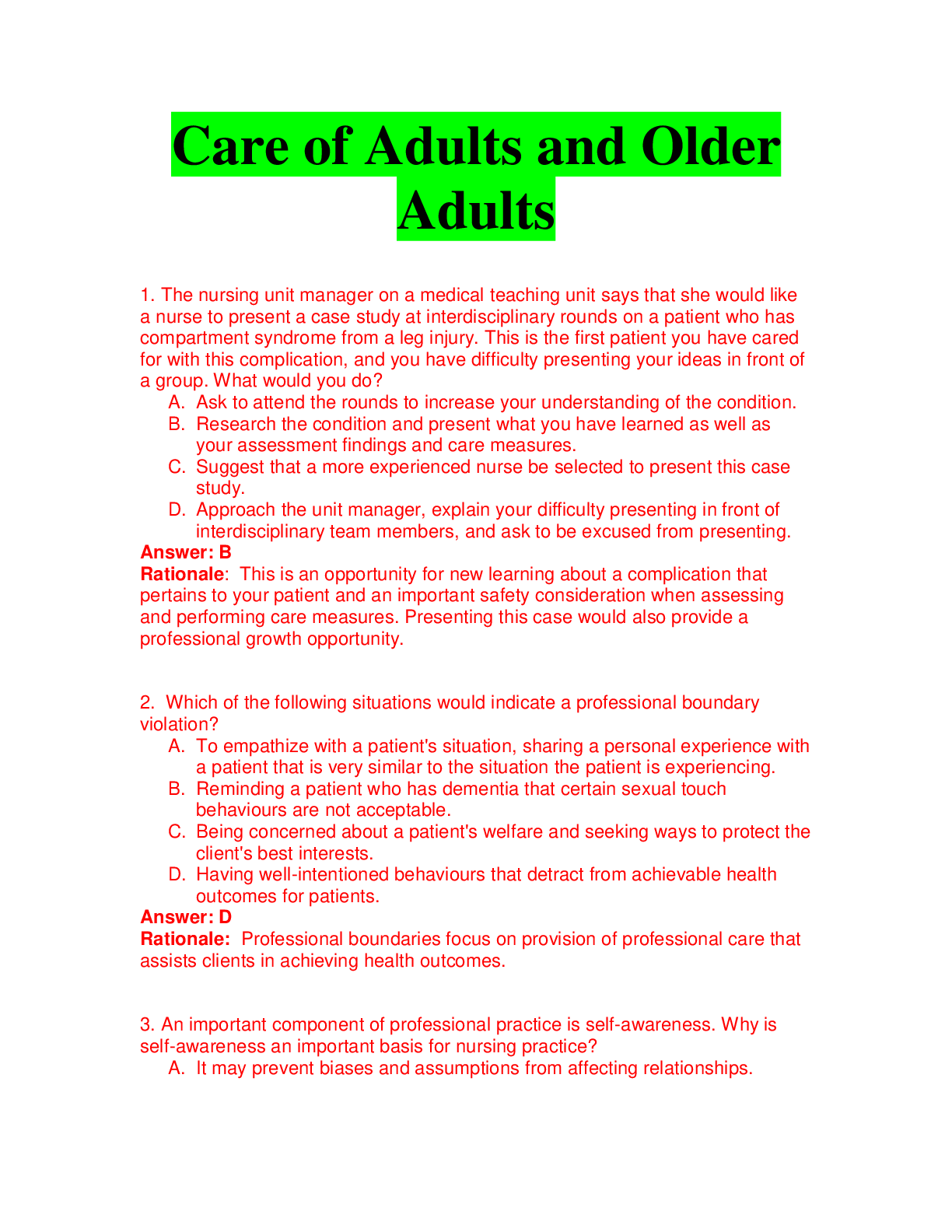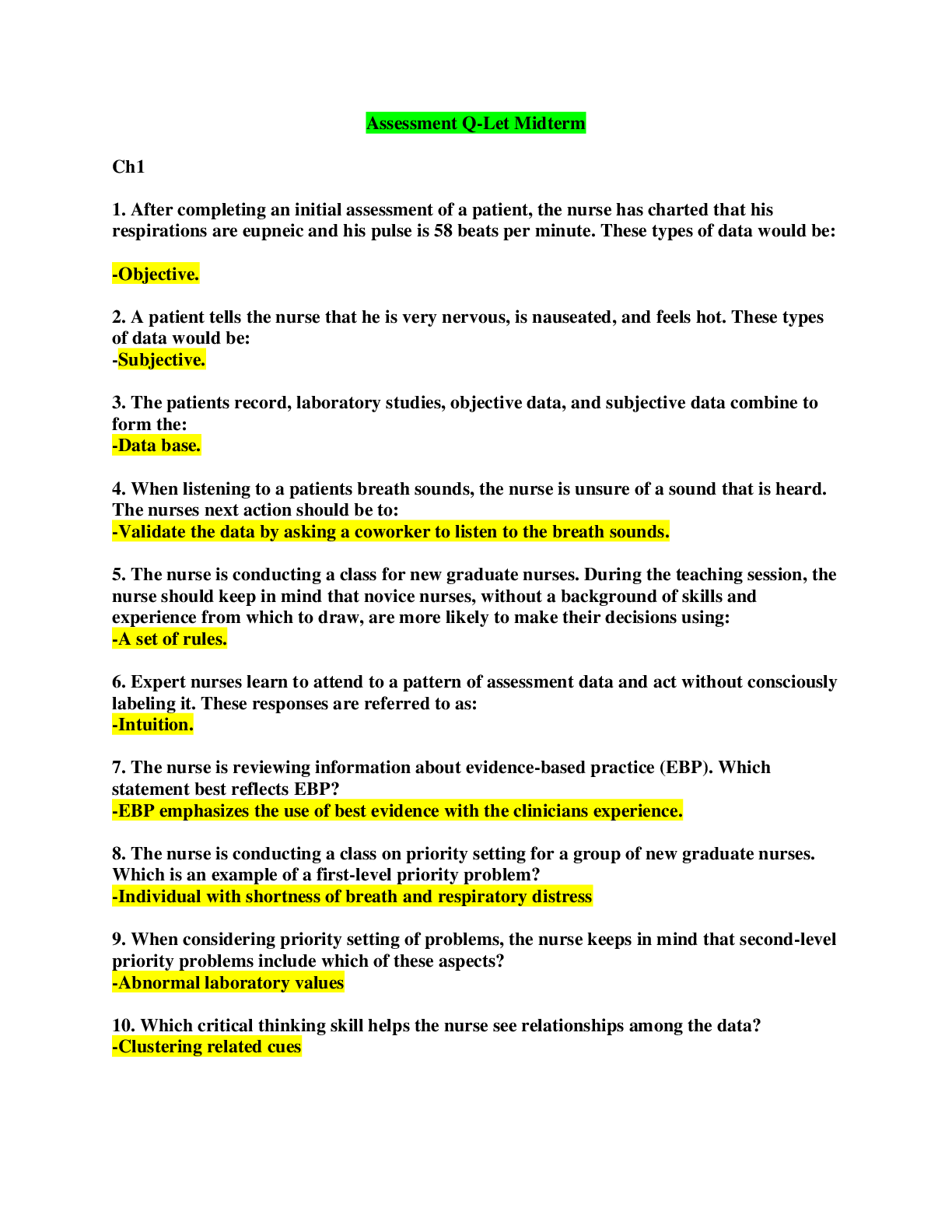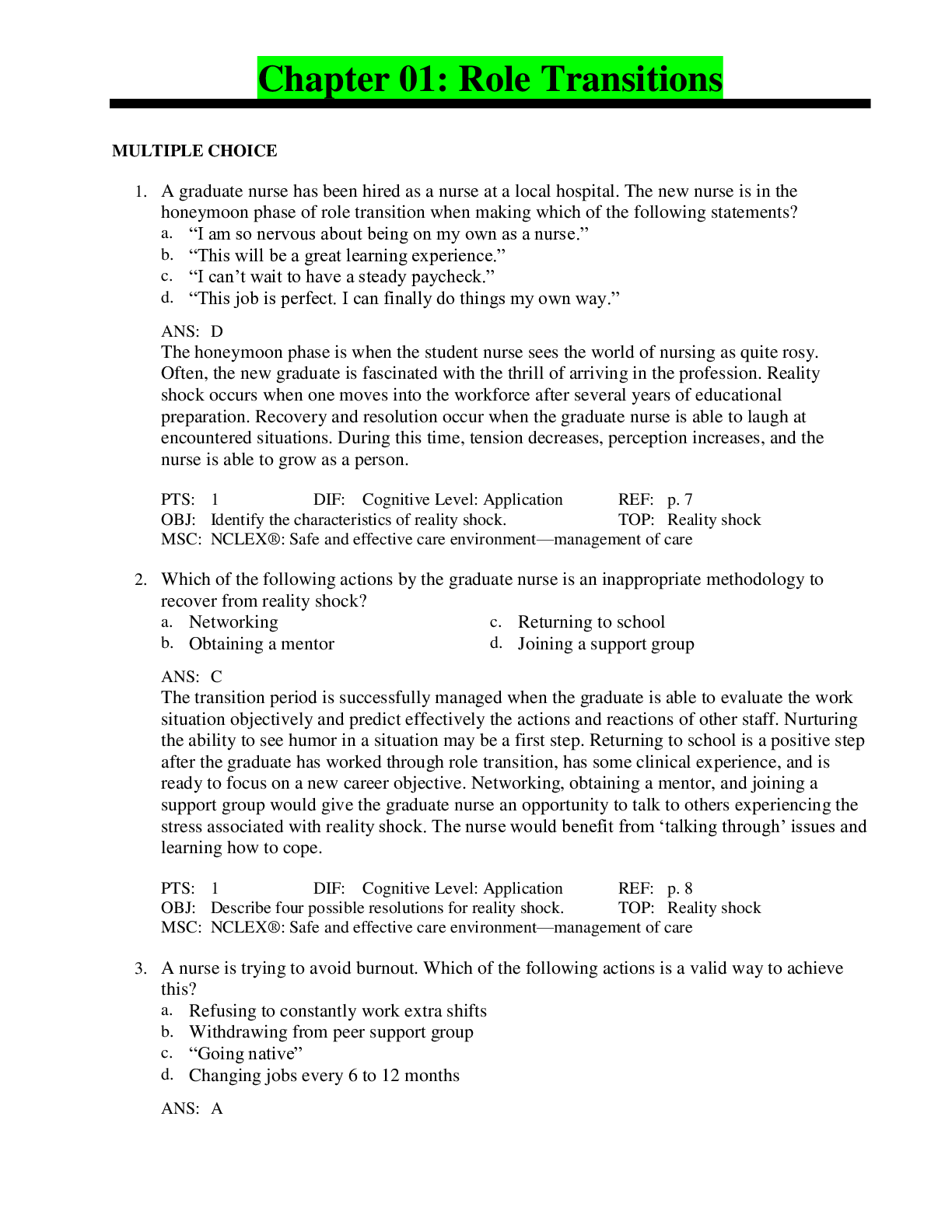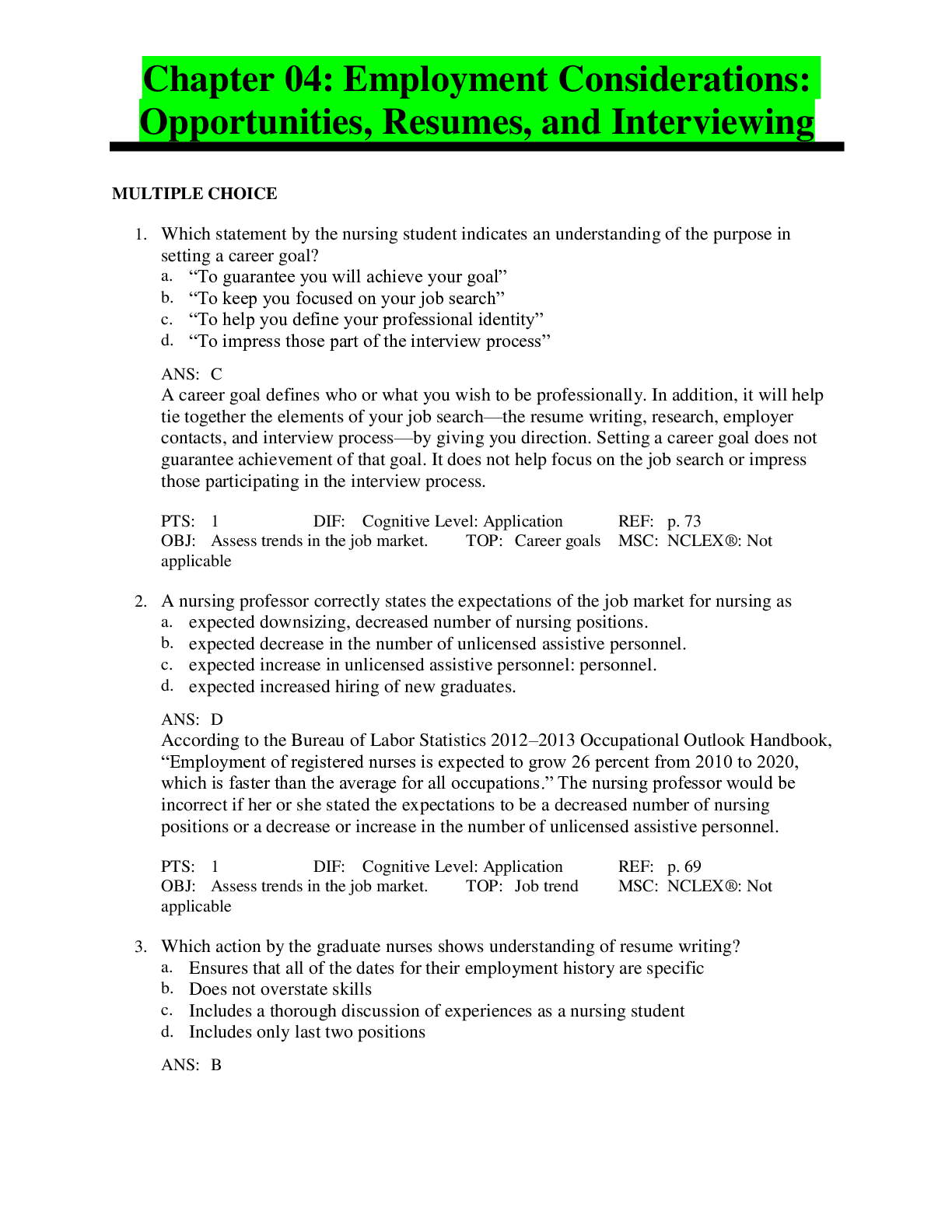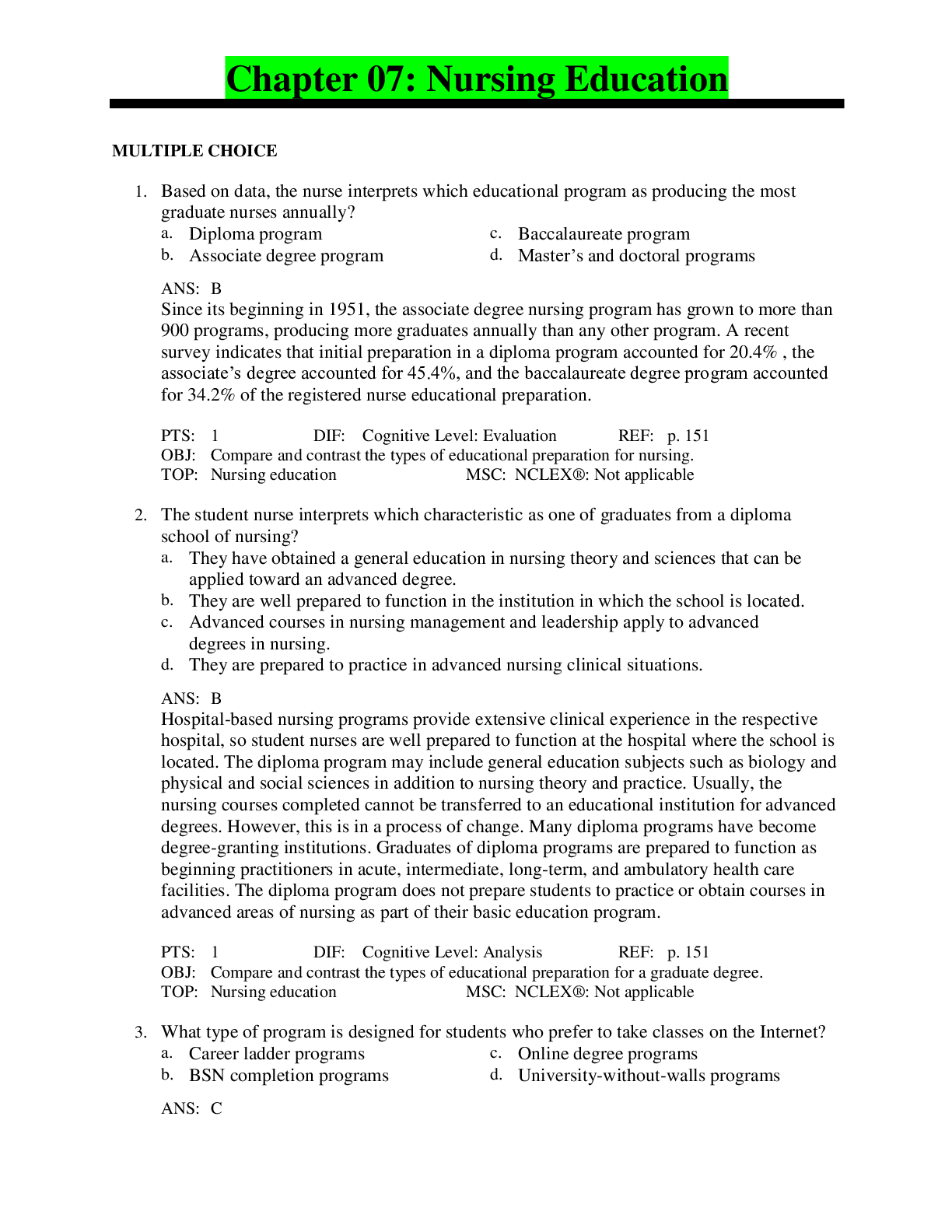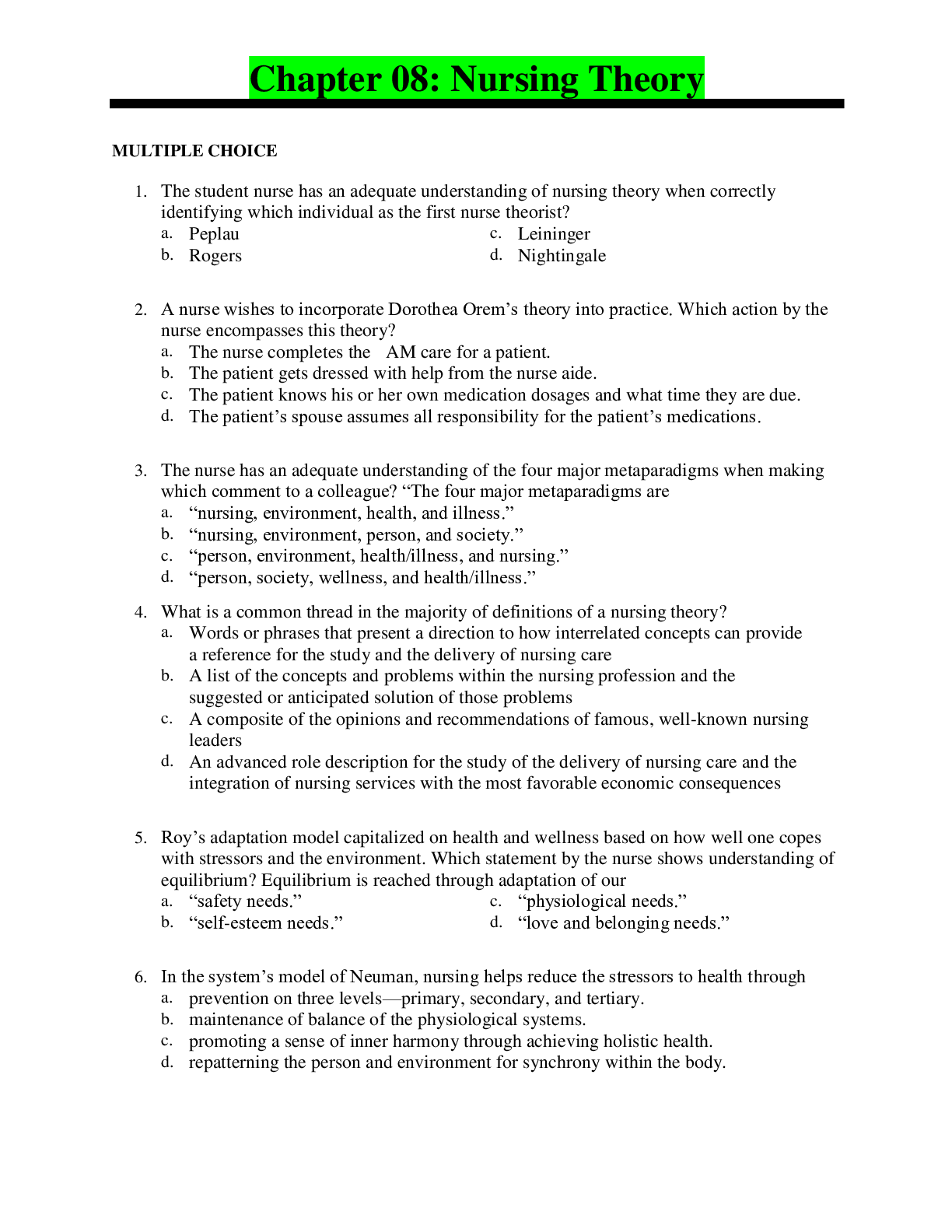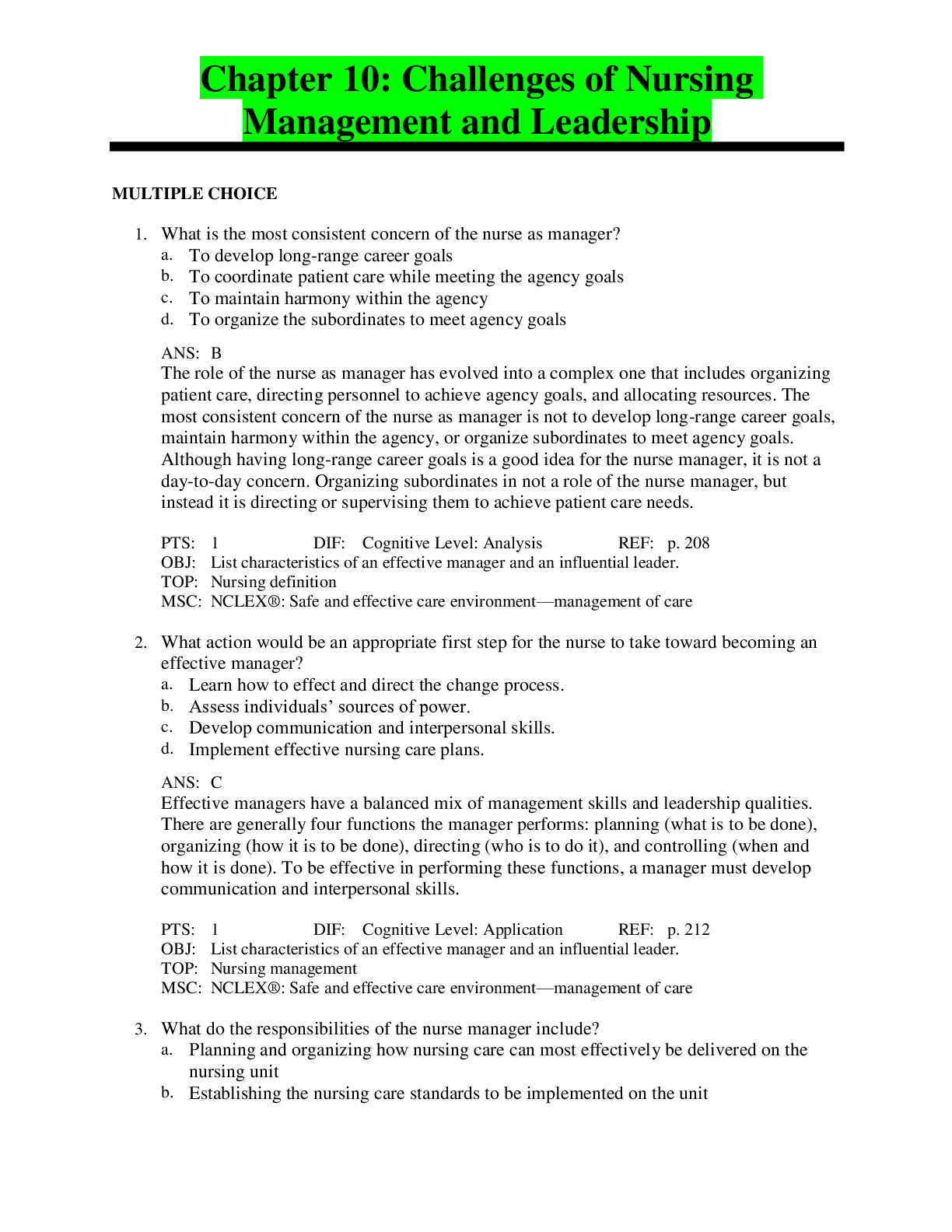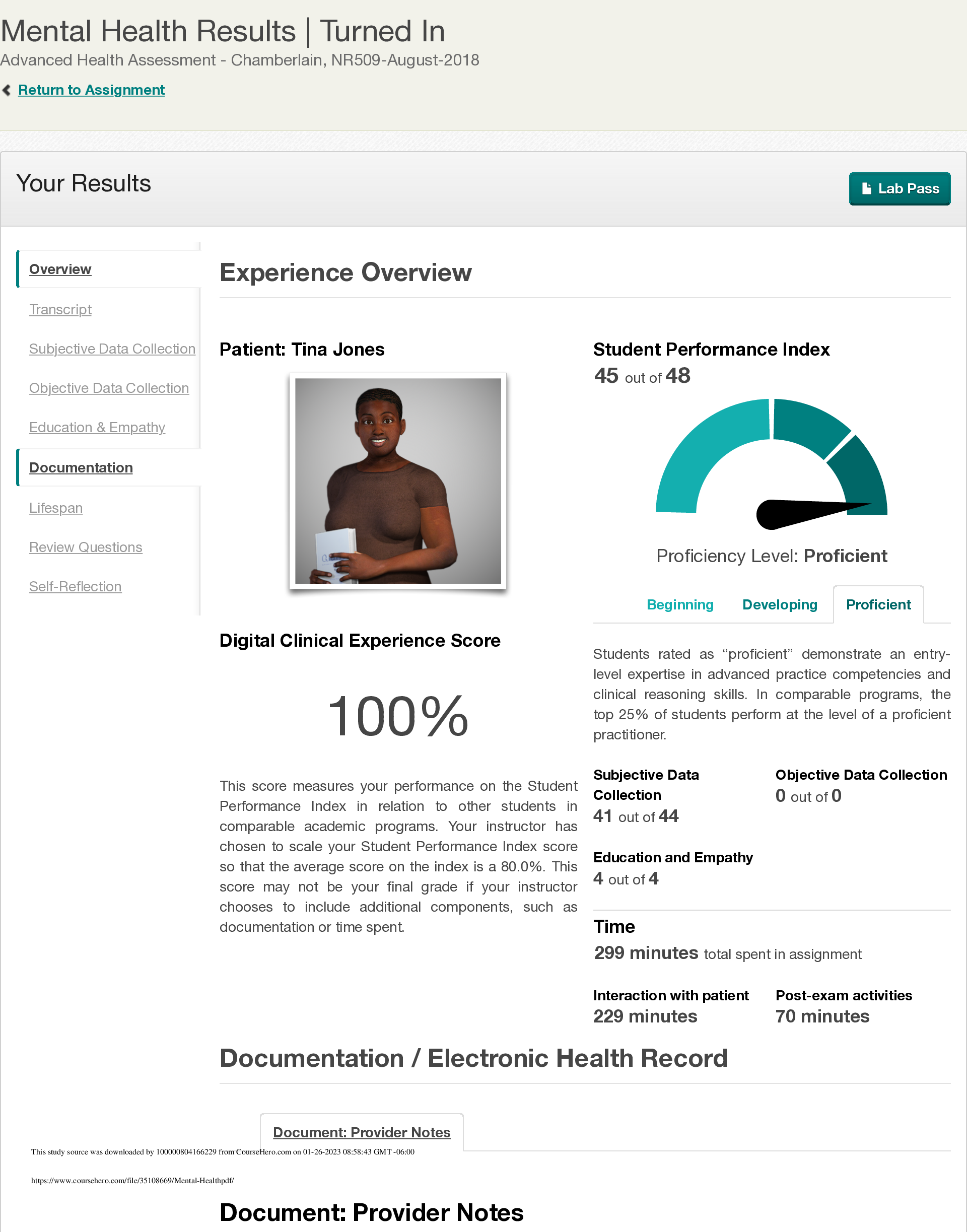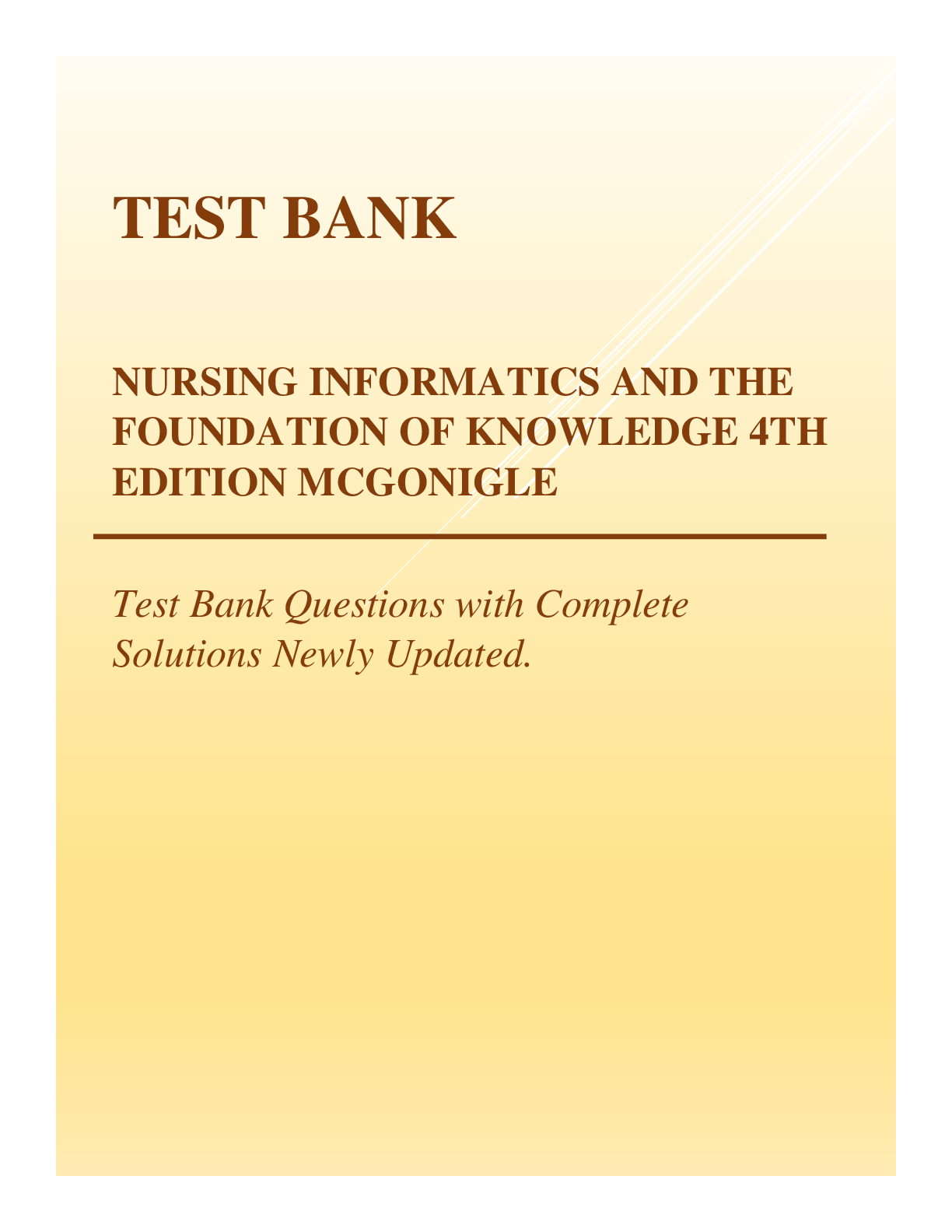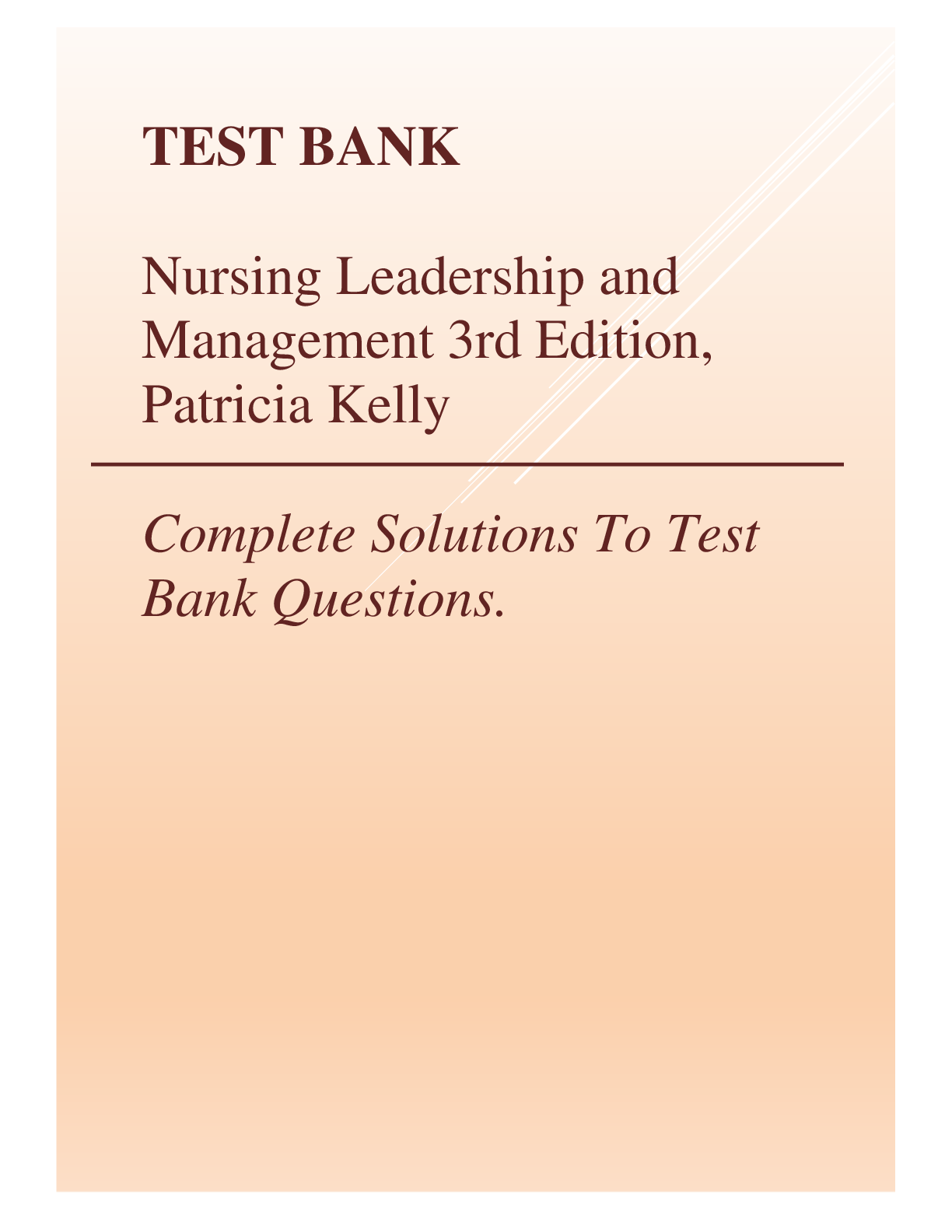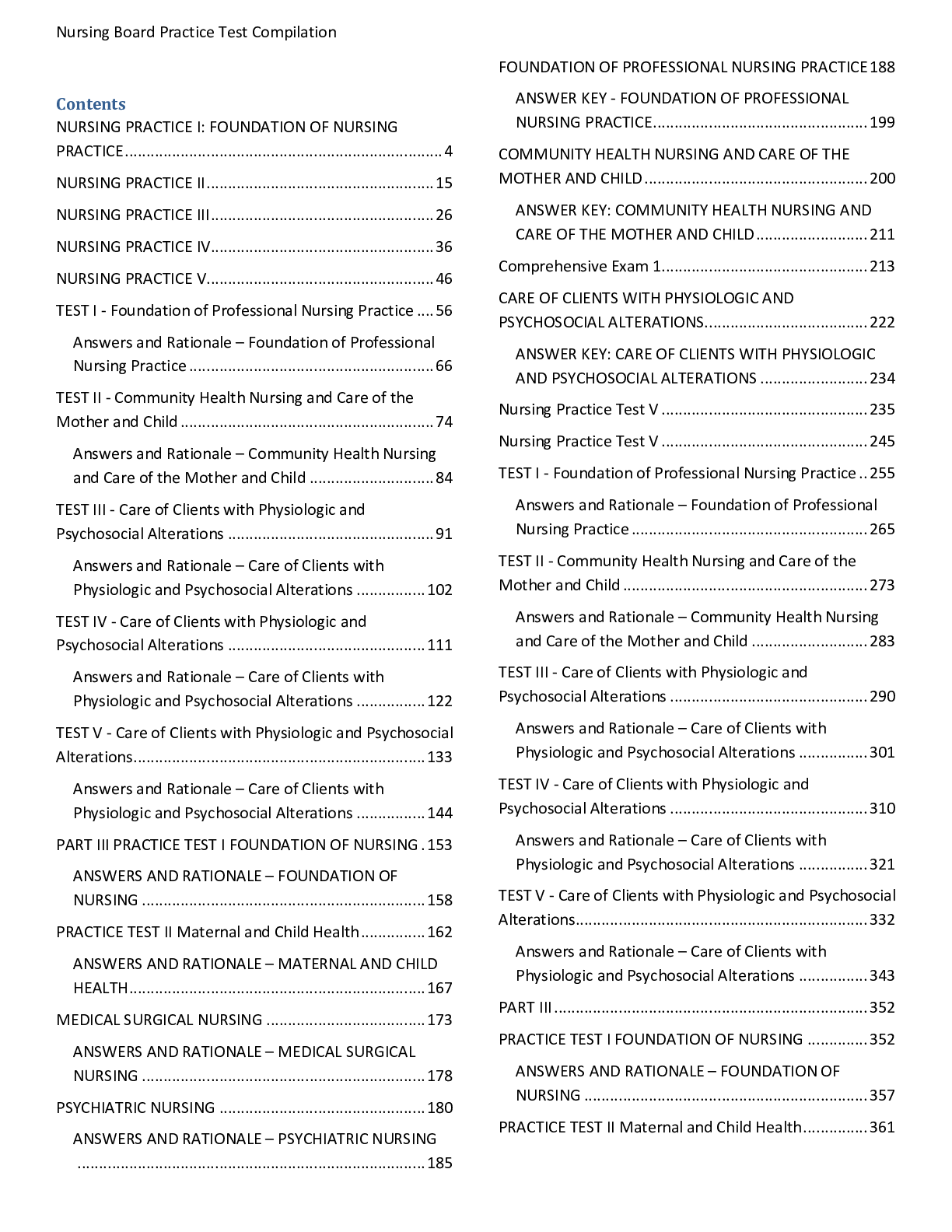*NURSING > QUESTIONS & ANSWERS > University Of Central Florida > Test Bank Nursing Today Transition Trends 8th Edition, JoAnn. Chapte (All)
University Of Central Florida > Test Bank Nursing Today Transition Trends 8th Edition, JoAnn. Chapter 03: Mentorship, Preceptorship, and Nurse Residency Programs
Document Content and Description Below
Chapter 03: Mentorship, Preceptorship, and Nurse Residency Programs MULTIPLE CHOICE 1. The nurse manager is presenting at a conference and shows an adequate understanding of a mentoring relatio... nship when giving the following as an example: a. A coach and a player c. An intern and a resident b. A teacher and a learner d. An advisor and a partner 2. The nurse professor is lecturing to students in their final semester of nursing school. Which statement by the nurse professor about mentoring is accurate? a. “Mentoring involves solving an individual’s problems.” b. “Mentoring focuses on the needs of someone else.” c. “Mentoring means helping someone reach his or her long-term goals.” d. “Mentoring requires pairing an experienced person with a novice.” 3. While discussing a mentoring program with the nursing director, the nurse manager correctly states that mentoring is a a. partnership. c. static relationship. b. one-way street. d. method of gaining more experience. 4. You are a graduate nurse in search of a mentor. To find a good “match,” what should you look for? a. Choose an experienced nurse who is successful. b. Look for things you and the potential mentor have in common. c. Be very specific with the questions you ask of the possible mentor. d. Be careful not to disclose too much personal information. 5. A group of nursing students is discussing mentors. One of the students correctly states a characteristic of a successful mentor when stating: a. “They ensure that their mentees do not fail.” b. “They push the mentees to a higher level.” c. “They always ask a lot of questions of their mentees.” d. “They encourage mentees to question their skills so they can improve.” 6. The role of the mentee needs to be understood early in the mentoring relationship. What is a characteristic or example of the mentee’s role? a. Not interrupting the mentor b. Absorbing what the mentor explains in detail c. Establishing personal short- and long-term goals d. Finding out what the mentor has to offer in terms of experience 7. Which statement indicates the student nurse’s understanding of a situational relationship? a. “A situational relationship occurs only one time.” b. “A situation relationship is established by the organization.” c. “In a situational relationship, both mentee and mentor mutually accept it.” d. “A situational relationship is structured to ensure situational success.” 8. The “honeymoon” is a specific phase of reality shock. What should the mentor do during this phase? a. Share personal transition experiences with the mentee. b. Reinforce the need for the mentee to problem solve. c. Encourage the mentee to try new things. d. Act as the intermediary for the mentee with all staff members. 9. A new graduate is looking for a mentor. Which staff nurse would be the best choice? a. Louise, a skilled clinician who appears hurried, curt, and occasionally sarcastic b. Jill, a new graduate who worked 2 years as an LPN and seems confident c. Juan, who has 3 years of experience, good skills, and a sense of humor d. Kim, who has 6 years of experience and is highly intellectual but is aloof and self-centered 10. Which of the following statements by the nurse indicates an understanding of mentors? a. “Mentors focus on fostering the mentee’s individual growth and development over an extended period of time.” b. “Mentors develop nurturing relationships during work time.” c. “Mentoring is the approach of assisting an individual’s growth through partnership.” d. “The strength of mentoring lies in the facilitation and development of personal qualities.” 11. A nursing student is in the mentoring process. Which action would occur if the student nurse were in the “follow” phase? a. The nursing student observes as the mentor places a urinary catheter. b. The nursing student places a urinary catheter while the mentor stands nearby for guidance. c. The nursing student reads the hospital policy regarding urinary catheter placement. d. The nursing student places the urinary catheter without guidance from the mentor. 12. A nursing student is in the mentoring process. Which action would occur if the nursing student were in the “Get out of the way phase?” a. The nursing student would assess chest tubes with the mentor nearby for guidance. b. The nursing student would assess chest tubes independently. c. The nursing student would observe the mentor assessing chest tubes. d. The nursing student would read the hospital policy on chest tubes. 13. A nursing student is meeting with a possible mentor for the last semester of nursing school. Which of the following questions would be most appropriate for the student to ask? a. “Do you like working on this unit?” b. “Do you like your coworkers?” c. “How are things going today?” d. “What kind of problems are you having?” 14. Which statement by the nursing student best describes the characteristics of a mentee? a. “The mentee should be passive and observe only.” b. “The mentee should challenge constructive feedback.” c. “The mentee should communicate clearly.” d. “The mentee should let learning opportunities come to him or /her.” 15. Which action by the mentor can help reduce the impact of reality shock on the mentee during the honeymoon phase? a. Listen as the mentee discusses the excitement of starting a new position as a nurse. b. Avoid discussions about the excitement of the mentee’s new position as a nurse. c. Ask the mentee not to discuss the new position during work hours. d. Tell the mentee that the excited will not last long. 16. What action can the mentor take to help reduce the impact of reality shock on the mentee during the shock or rejection phase? a. Withhold personal transition stories. b. Encourage the mentee to discuss his or her feelings. c. Encourage mentees to keep their feelings to themselves during work hours. d. Ignore the feelings caused by reality shock. 17. Which action by the mentor can help reduce the impact of reality shock on the mentee during the recovery phase? a. Encourage the mentee to perform skills that he or she is comfortable with. b. Maintain a semi-open line of communication. c. Encourage the mentee to try new skills. d. Allow the mentee to work independently. 18. Which action by the mentor can help reduce the impact of reality shock on the mentee during the resolution phase? a. Expect the mentee to problem solve clinical issues independently. b. Continue to practicing skills that he or she is comfortable with. c. Reinforce positive qualities that the mentee possesses. d. Point out negative qualities for the mentee to change. MULTIPLE RESPONSE 1. Review the following characteristics. Which best describe the role of the mentor? (Select all that apply.) a. Requires a primary focus on the needs of the new nurse b. Assists the new nurse with difficult nursing procedures c. Serves as a primary resource on the nursing unit for the new nurse d. Is assigned to the new nurse for the orientation period e. Is interested in the new nurse’s personal growth and nursing goals f. Is available to the new nurse after hours to discuss problems and needs 2. A nurse manager and a nurse director are discussing e-mentoring. Which statements by the nurse director indicate an understanding of the components of e-mentoring? (Select all that apply.) a. “E-mentoring involves distance mentoring.” b. “E-mentoring is done through instant messaging.” c. “E-mentoring involves contact between mentee and mentor via electronic mail.” d. “E-mentoring is a mentoring program for first-year nursing students.” e. “E-mentoring uses a videoconferencing system such as Skype to meet virtually.” f. “E-mentoring involves planning a meeting at a coffee shop to discuss progress of the preceptorship.” 3. A group of nursing students are discussing characteristics of a successful mentor. Which of the following statements identify these characteristics? (Select all that apply.) a. “Successful mentors are passive.” b. “Successful mentors communicate high expectations.” c. “Successful mentors are good listeners.” d. “Successful mentors show empathy.” e. “Successful mentors are nonjudgmental.” 4. Which statement(s) by the nursing student best describes the attributes of a mentor? (Select all that apply.) a. “A mentor actively advises, supports and promotes the mentee’s career.” b. “A mentor is a professional who has any amount of experience as a nurse.” c. “Mentors have the mentee’s best interest at heart.” d. “Mentors bolster self-confidence.” e. “Mentors provide support for only a short period of time.” [Show More]
Last updated: 1 year ago
Preview 1 out of 9 pages
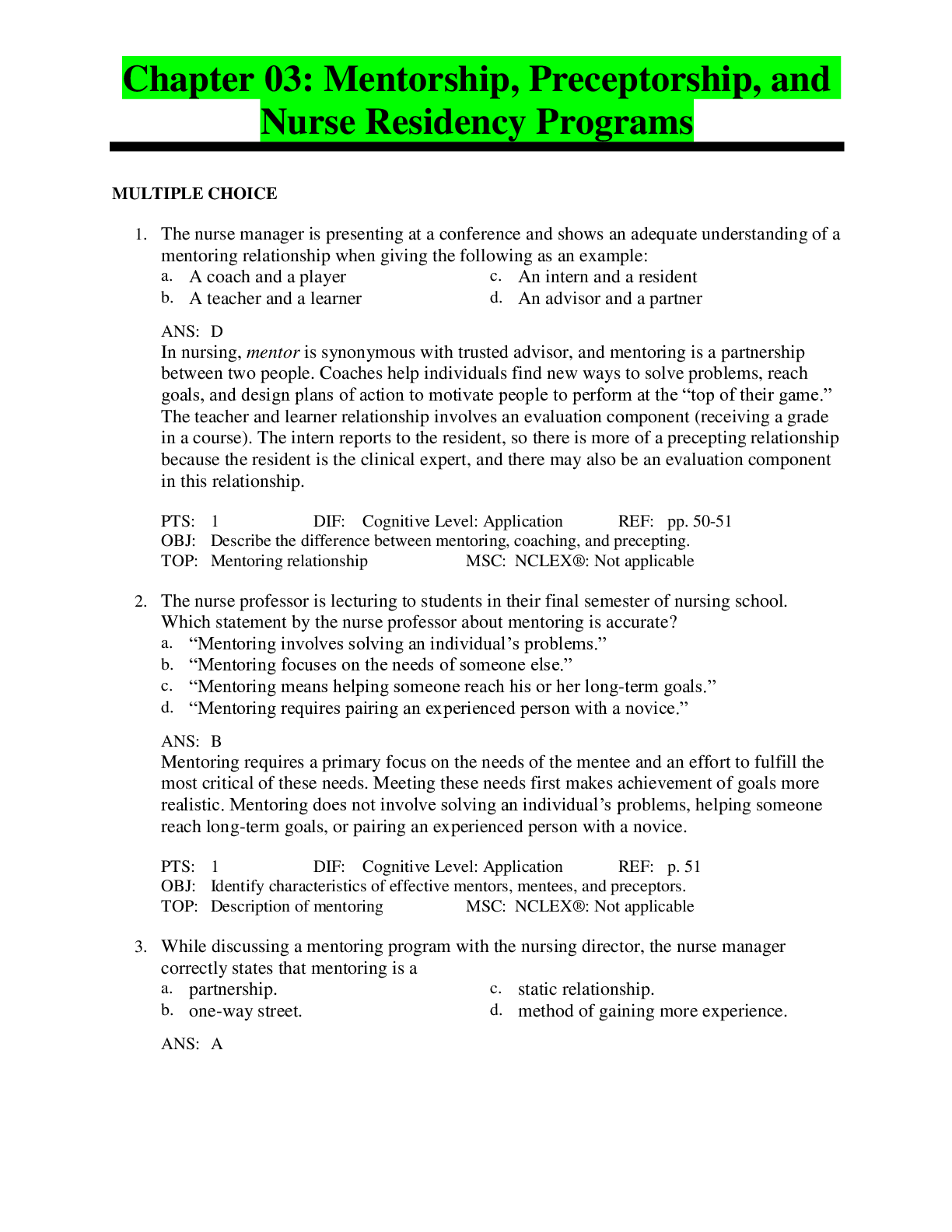
Buy this document to get the full access instantly
Instant Download Access after purchase
Add to cartInstant download
We Accept:

Reviews( 0 )
$7.00
Document information
Connected school, study & course
About the document
Uploaded On
Apr 24, 2020
Number of pages
9
Written in
Additional information
This document has been written for:
Uploaded
Apr 24, 2020
Downloads
0
Views
45

